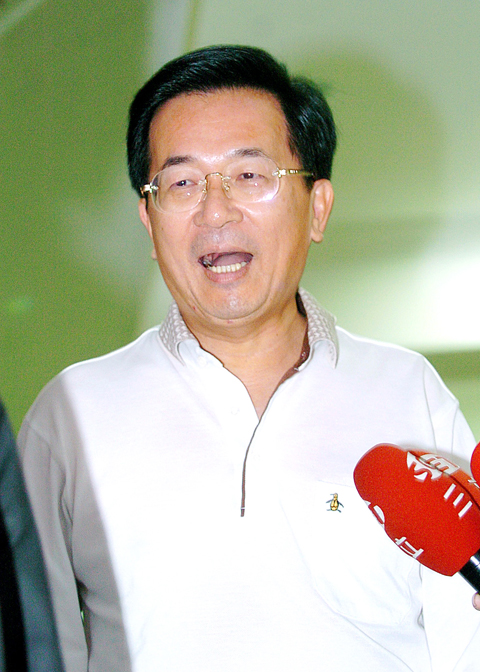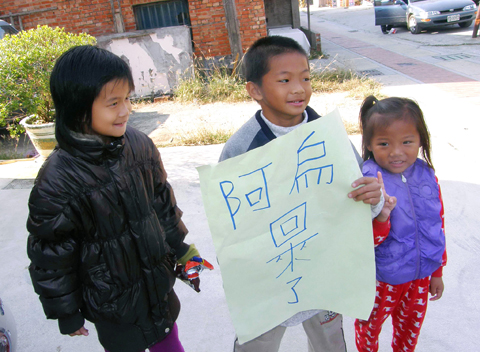Former president Chen Shui-bian (陳水扁) was released from detention at around 1:20am yesterday after a four-hour hearing.
“This was the toughest and loneliest 32 days of my life. But I really appreciate what the judges did back in the courtroom and what my supporters did the entire time,” he said. “Regarding those reminders from the judges, I will keep them in mind.”
Chen was referring to advice from the judges that he not use his “personal charm” with supporters to make the case more complicated.

PHOTO: FANG PIN-CHAO, TAIPEI TIMES
Judges also said he shouldn’t travel around the country making public appearances like he did prior to the indictment.
When releasing Chen, the panel of three Taipei District Court judges banned him from changing his address or leaving the country.
Chen, who appeared in the court lobby after changing into a dark suit, thanked the judges and promised to honor the terms of his release.

PHOTO: WU CHUN-FONG, TAIPEI TIMES
Chen shook hands briefly with some of the 20 supporters who had gathered outside the courthouse before heading home.
Presiding Judge Chou Chan-chun’s (周占春) order to free Chen said that the court was releasing him without bail because Chen had not missed a summons.
Chou also said that Chen had no chance to flee because as a former president, he is constantly protected and escorted by special agents.
The Supreme Prosecutors’ Office’s Special Investigation Panel (SIP) said that it would not appeal.
“We shall not appeal this,” SIP Spokesman Chen Yun-nan (陳雲南) said.
The spokesman said that Chou’s decision to release the former president would not have an impact on the investigation.
“We cannot do anything about it even if it could,” he said. “We will continue our efforts on this case and this is the only thing we can do.”
The former president’s lawyer, Cheng Wen-long (鄭文龍), welcomed the decision to release Chen, saying it would help increase judicial credibility.
“This is a step forward for Taiwan’s judicial system. It will also ease doubt about prosecutors forcing confessions by detaining Chen,” he said.
The former president, locked up since Nov. 12, was indicted on charges of embezzling government funds, money laundering and forgery along with 13 others, including his wife, son and daughter-in-law. As prosecutors are seeking the “severest penalty,” legal experts say that Chen, the first former president to be indicted, could face life in prison if convicted.
Chen Shui-bian, who pledged to clean up government when he was elected in 2000, left office in May after serving two four-year terms as president.
Prosecutors say the 58-year-old Chen, a lawyer by training, and his wife Wu Shu-chen (吳淑珍), embezzled about US$3 million in public funds and, along with two other people, accepted a bribe of about US$12 million on a land deal.
Their son Chen Chih-chung (陳致中) and daughter-in-law Huang Jui-ching (黃睿靚), along with 10 others, were indicted for corruption and money laundering in connection with the case.
After his release, Chen Shui-bian received a haircut at a barbershop. He smiled at reporters but made no comment.
Former first lady Wu Shu-jen’s (吳淑珍) lawyer Lee Sheng-hsiung (李勝雄) lauded the judges yesterday for making a “brave” decision to release Chen, but urged the court to release former National Security Council secretary-general Chiou I-jen (邱義仁) and former Bureau of Investigation director-general Yeh Sheng-mao (葉盛茂) as well.
Lee said he called Wu immediately after Chen was released, and that Wu said she wanted to thank God for the news.
Former vice president Annette Lu (呂秀蓮) also lauded the court’s decision yesterday as a move that tallied with law and order and respected human rights.
“The most important part of the judiciary is procedural justice ... Chen and his lawyers should face the case calmly and rationally, and society should not interfere with the trial,” she said while attending an event in Taichung City.
Meanwhile, Washington expressed hope that Taiwan’s legal system would be “transparent, fair and impartial.”
In response to a question on the indictment of the former president during a daily press briefing, State Department spokesman Sean McCormack read a short, prepared statement that said: “We are confident in Taiwan’s democracy and its legal system. And we have every expectation that the process will be transparent, fair and impartial.”
He declined to comment on allegations that the investigation was marred by political interference.

Japanese Prime Minister Sanae Takaichi yesterday lavished US President Donald Trump with praise and vows of a “golden age” of ties on his visit to Tokyo, before inking a deal with Washington aimed at securing critical minerals. Takaichi — Japan’s first female prime minister — pulled out all the stops for Trump in her opening test on the international stage and even announced that she would nominate him for a Nobel Peace Prize, the White House said. Trump has become increasingly focused on the Nobel since his return to power in January and claims to have ended several conflicts around the world,

UKRAINE, NVIDIA: The US leader said the subject of Russia’s war had come up ‘very strongly,’ while Jenson Huang was hoping that the conversation was good Chinese President Xi Jinping (習近平) and US President Donald Trump had differing takes following their meeting in Busan, South Korea, yesterday. Xi said that the two sides should complete follow-up work as soon as possible to deliver tangible results that would provide “peace of mind” to China, the US and the rest of the world, while Trump hailed the “great success” of the talks. The two discussed trade, including a deal to reduce tariffs slapped on China for its role in the fentanyl trade, as well as cooperation in ending the war in Ukraine, among other issues, but they did not mention

REASSURANCE: The US said Taiwan’s interests would not be harmed during the talk and that it remains steadfast in its support for the nation, the foreign minister said US President Donald Trump on Friday said he would bring up Taiwan with Chinese President Xi Jinping (習近平) during a meeting on the sidelines of the APEC Summit in South Korea this week. “I will be talking about Taiwan [with Xi],” Trump told reporters before he departed for his trip to Asia, adding that he had “a lot of respect for Taiwan.” “We have a lot to talk about with President Xi, and he has a lot to talk about with us. I think we’ll have a good meeting,” Trump said. Taiwan has long been a contentious issue between the US and China.

GLOBAL PROJECT: Underseas cables ‘are the nervous system of democratic connectivity,’ which is under stress, Member of the European Parliament Rihards Kols said The government yesterday launched an initiative to promote global cooperation on improved security of undersea cables, following reported disruptions of such cables near Taiwan and around the world. The Management Initiative on International Undersea Cables aims to “bring together stakeholders, align standards, promote best practices and turn shared concerns into beneficial cooperation,” Minister of Foreign Affairs Lin Chia-lung (林佳龍) said at a seminar in Taipei. The project would be known as “RISK,” an acronym for risk mitigation, information sharing, systemic reform and knowledge building, he said at the seminar, titled “Taiwan-Europe Subsea Cable Security Cooperation Forum.” Taiwan sits at a vital junction on